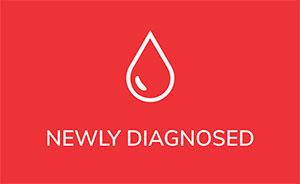One of the difficult things about being newly diagnosed with chronic lymphocytic leukemia (CLL) or small lymphocytic lymphoma (SLL) is having to watch and wait. Traditionally, patients with CLL / SLL do not start treatment until they develop symptoms or changes in blood counts. A landmark study showed that early treatment with chemotherapy did not improve survival. In fact, starting treatment early was slightly worse for patients because of chemotherapy’s side effects and toxicities. However, since this study was done, a number of targeted therapies have become available, and they are more specific and less toxic than chemotherapy. Now researchers want to know if early intervention with targeted therapies might potentially be beneficial for some patients.
At the American Society of Hematology (ASH) 2021, Dr. Matthew Davids, Associate Director of the Center for Chronic Lymphocytic Leukemia at Dana-Farber Cancer Institute in Boston, MA, interviewed Dr. Deborah Stephens, a CLL specialist at the University of Utah Huntsman Cancer Institute. They discussed an ongoing clinical trial currently recruiting patients to see if early intervention with venetoclax plus obinutuzumab can produce better outcomes for high-risk patients compared with traditional delayed therapy.
Takeaways:
- This is a clinical trial that is currently in progress and recruiting patients.
- Patients will receive venetoclax plus obinutuzumab for about 1 year, starting either around the time of diagnosis or when symptoms develop (which is when treatment normally starts).
- Venetoclax is a BCL2 inhibitor, and obinutuzumab is an anti-CD20 monoclonal antibody. The combination of these drugs has been very effective for treating CLL that has not been previously treated.
- The combination of venetoclax plus obinutuzumab is also a time-limited treatment, meaning that you take it for a certain amount of time and then stop. This is good for early treatment because you don’t have to take the drugs for a long time and thus reduce the potential for side effects.
- The primary endpoint for this study is overall survival (how long people live).
- This study is enrolling newly diagnosed patients with high-risk disease because they may benefit the most from early treatment. Unfortunately, these patients have the highest risk of short times until they need their first treatment and shorter overall survival.
- High-risk disease is determined based on several prognostic indicators that your doctor will need to help you choose.
- There is no placebo group. Early treatment is being compared with the current standard of care, which in this case is watch and wait.
Conclusions:
This exciting study will give us much-needed information about when we can start treatment with targeted therapies. If you have been diagnosed with CLL / SLL within the last year and are interested in participating, you can find more information on clincaltrials.gov here.
Please enjoy this interview with Dr. Stephens from the ASH meeting held in December 2021 in Atlanta, GA, and virtually.
You can read the actual abstract here: Randomized, Phase III Study of Early Intervention with Venetoclax and Obinutuzumab Versus Delayed Therapy with Venetoclax and Obinutuzumab in Newly Diagnosed Asymptomatic High-Risk Patients with Chronic Lymphocytic Leukemia/Small Lymphocytic Lymphoma (CLL / SLL): Evolve CLL / SLL Study (SWOG S1925; NCT#04269902)
Take care of yourself first.
Ann Liu, PhD

















